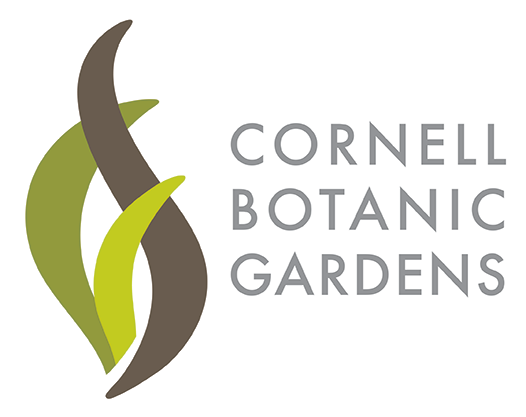News
Become a Youth Wildflower Guide!
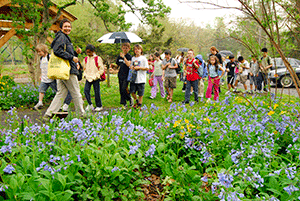 As part of Ithaca’s Kids Discover the Trail program, Cornell Plantations offers a spring program for all Ithaca 3rd graders. "Wildflower Exploration: Learning about Plants through Wildflowers" is designed with a school component that prepares the students for their field trip to the Mundy Wildflower Garden.
As part of Ithaca’s Kids Discover the Trail program, Cornell Plantations offers a spring program for all Ithaca 3rd graders. "Wildflower Exploration: Learning about Plants through Wildflowers" is designed with a school component that prepares the students for their field trip to the Mundy Wildflower Garden. No experience is necessary just a love for kids and commitment to attend training sessions to learn about our local wildflowers.
If you are interested in delivering this program to children in area schools, contact Raylene Ludgate at (607) 255-2407 or [email protected].
Training Sessions
The training sessions are held on Wednesdays starting February 13th from 10:30 to 12 noon and continue once per week until the end of April. The sessions are designed to prepare you for facilitating activities in the classroom and leading field trips through the Mundy Wildflower Garden at Cornell Plantations. You will also have the opportunity to shadow experienced guides.
School and Garden Visits
School and garden visits take place weekdays during school hours (8am to 2pm) starting May 1st. You pick the actual dates/times that work with your schedule.
After-holiday sale in the Garden Gift Shop
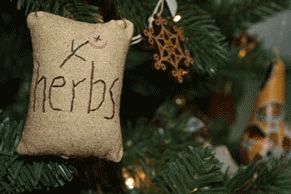 If you want to stock up on unique ornaments, decorations or other holiday items, all holiday-themed items in our gift shop are 30% off from now until the end of January. And, if you are a member, you will receive an additional 10% discount.
If you want to stock up on unique ornaments, decorations or other holiday items, all holiday-themed items in our gift shop are 30% off from now until the end of January. And, if you are a member, you will receive an additional 10% discount.Please note: The gift shop and the Nevin Welcome Center are closed on weekends in January. It is open Tuesday through Friday, 10 a.m. to 4 p.m. Starting in February, it will again be open on Saturdays.
On Display in the Nevin Welcome Center: "Trees of the Arboretum," photographs by Bo Lipari
 For lovers of trees, the F.R. Newman Arboretum is an amazing and wonderful space rich in color, detail, shape and form. The tree collections present visitors with a cornucopia of species, varieties, shapes and colors that can be enjoyed throughout the year.
For lovers of trees, the F.R. Newman Arboretum is an amazing and wonderful space rich in color, detail, shape and form. The tree collections present visitors with a cornucopia of species, varieties, shapes and colors that can be enjoyed throughout the year.Bo Lipari, a local resident and volunteer Docent at Cornell Plantations, has taken pleasure in the beauty of the Arboretum for many years. In 2008 he began photographing Arboretum views, scenes and trees, trying to capture some of the brilliance and beauty he has found there. This exhibit focuses on the trees - the bark, branches, forms and foliage that capture the eyes and stir the primal connections that still reside within us.
Bo's photographs will be on display in the lobby of the Nevin Welcome Center from now through February.
F. R. Newman Arboretum closed for winter
The F. R. Newman Arboretum is closed to vehicle traffic until further notice. Pedestrians are welcome to explore the arboretum every day from dawn to dusk. Parking is available at the Mundy Wildflower Garden parking lot off of Caldwell Road directly across from the arboretum.
Cascadilla Gorge Trail closed for winter
The Cascadilla Gorge Trail from Downtown to Stewart Avenue is now closed for the Winter. Read more
The Cascadilla Gorge Trail from Downtown to Stewart Avenue is now closed for the Winter. The trail is closed due to hazardous conditions from snow, ice, and falling rock that create unsafe conditions. This section of trail will re-open in the spring when conditions allow.
Lead Gift Commitment for New Peony & Perennial Gardens
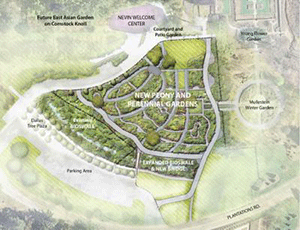 Dr. Peter B. Stifel ’58 has made the lead gift commitment for Cornell Plantations’ new Peony and Perennial Gardens, in honor of his daughter, Katherine Stifel ’87. Building on the success of the opening of the Brian C. Nevin Welcome Center, Plantations is now moving forward in the next phase of an ambitious plan to reimagine the Botanical Garden. In the most significant horticultural development since the F. R. Newman Arboretum was created in 1981, the broad expanse of lawn in front of the Nevin Center will be transformed into a beautiful series of new perennial gardens, while the plateau on Comstock Knoll will become a dramatic East Asian garden.
Dr. Peter B. Stifel ’58 has made the lead gift commitment for Cornell Plantations’ new Peony and Perennial Gardens, in honor of his daughter, Katherine Stifel ’87. Building on the success of the opening of the Brian C. Nevin Welcome Center, Plantations is now moving forward in the next phase of an ambitious plan to reimagine the Botanical Garden. In the most significant horticultural development since the F. R. Newman Arboretum was created in 1981, the broad expanse of lawn in front of the Nevin Center will be transformed into a beautiful series of new perennial gardens, while the plateau on Comstock Knoll will become a dramatic East Asian garden.
Click here to read more.
Holiday Sale at our Garden Gift Shop this Friday and Saturday
Join us on Friday, December 14 and Saturday, December 15 for another holiday sale! Cornell Plantations members along with Cornell faculty, staff and students will receive 30% off their total purchase*.
Non-members will get 20% off their total purchase*.
*Discount excludes prints and other works of art, and Cornell Sheep Program blankets.
Nevin Welcome Center Holiday Hours
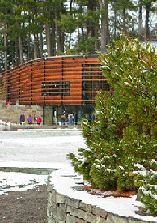 The Nevin Welcome Center will be closed from Saturday, December 22nd and reopen on Wednesday, January 2, 2013.
The Nevin Welcome Center will be closed from Saturday, December 22nd and reopen on Wednesday, January 2, 2013.
As always, the grounds are free and open to the public every day from dawn to dusk.
Enjoy the holiday season!
FEMA awards $880,000 grant to repair Cascadilla Gorge trail
Read more in the November 29 Cornell Chronicle online article, "FEMA awards $880,000 grant to repair gorge trail."
Plantations’ Brian C. Nevin Welcome Center Awarded LEED Gold
The Brian C. Nevin Welcome Center was completed in November 2010 and officially opened to the public on February 1, 2011. The Brian C. Nevin Welcome Center is an important part of modernization and infrastructural improvements made at Plantations over the last decade; it is referred to as the "grand finale" of a decade-long construction cycle that has seen new gardens, the redesign of office space, and multiple other projects. Built in the center of the Botanical Garden, at the confluence of existing walking paths, the building is tucked itself into the center of the gardens offering visitors a welcoming experience to Cornell Plantations.
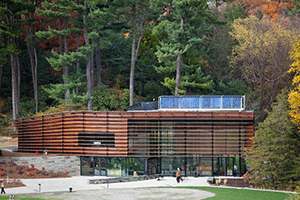
Photo by Jon Reis
Among the notable green building features of the Nevin Welcome Center are wood louvers across the front of the building which serve to filter summer sunlight and admit winter sun for passive heating; rooftop solar tube collectors which generate winter heat; a motorized vent/skylight that provides natural ventilation, and a green roof which helps insulate and protect the roof while also treating stormwater.

Green roof (photo by Toby Wolf)
Additional features include the extensive use of natural light, local and recycled materials; low-emitting healthy materials; and energy saving lighting fixtures and controls. In addition to the building itself, the project received points for its construction management techniques, recycling up to 96% of the waste generated during construction. Rounding out the project were significant landscape elements that contributed to the sustainable sites LEED category including a beautifully designed bioswale garden that cleanses water as it runs off the site and parking areas and the use of structural soil to allow for tree growth in a paved environment.
Buildings that receive LEED V.2 Gold designation from the U.S. Green Building Council must earn 39 to 51 points points distributed across five major credit categories: Cornell Plantations’ Nevin Welcome Center received 47 points, obtaining points across each category – Sustainable Sites (10), Water Efficiency (2), Energy and Atmosphere (11), Materials and Resources (5), Indoor Environmental Quality (14), and Innovation and Design (5). 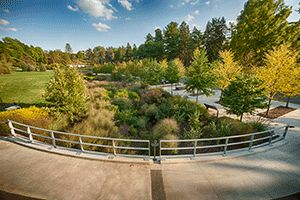
Bioswale garden and parking lot (photo by Chris Kitchen)
In addition to being a welcome center for Plantations visitors, the building also serves as a teaching tool for many groups interested in learning more about green buildings, “I direct many of the campus and student groups interested in green buildings to tour the Nevin Welcome Center. Not only does the building have a connection with the natural world in both form and materials, but many of the technological and design aspects of green building are clearly visible and are easily described to and understood by visitors.” says Matt Kozlowski, environmental project coordinator at Cornell University.
The Brian C. Nevin Welcome Center is named for Brian C. Nevin ’50, at the request of the primary benefactor, C. Sherwood “Woody” Southwick Jr. The Nevin Welcome Center with its Gold LEED designation is a significant step forward in Plantations’ and Cornell’s commitment to sustainability. Don Rakow, the Elizabeth Newman Wilds Director of Cornell Plantations states, “Cornell Plantations is committed to a sustainable future, as such we are thrilled to receive the USGBC's LEED Gold designation for the Nevin Welcome Center. Plantations has long needed a single site where we can greet visitors, provide them with orientation and interpretation about our collections and meet their amenity needs. This dream was fulfilled with the opening of the Center, which helps us achieve our sustainability and educational goals.”
Baird Sampson Neuert Architects, the designers of the Brian C. Nevin Welcome Center at the Cornell Plantations, have received much recognition for their design of this ultra-green building. The Nevin Welcome Center has won a “Award of Excellence” from the AIA New York Chapter, an “Honor Award” at the Tri-state AIA annual conference, a “Design Excellence” award from the Ontario Architects’ Association, and Canadian Architect magazine and online journal. The building has been featured in several publications and most recently was featured in Greensource Magazine in May 2012. The general contractor for the project was Welliver, landscape construction was provided by Cayuga Landscape, and the project was managed by the Cornell Facilities Services department formerly known as Planning Design and Construction. On November 27, 2012, Cornell Plantations will receive its LEED Gold plaque from Tracie Hall, the Executive Director of the U.S. Green Building Council’s Upstate New York Chapter in a small ceremony.
Phase one of Fall Creek Gorge Trails renovation completed
 In an effort to make trails in and around Fall Creek safer, approximately 2,200 feet of trails and staircases have been renovated, with 2,700 feet of new railings and fences installed on trails between the Stewart and Thurston Avenue bridges. This is just one part of the renovations that have been completed since May 2012.
In an effort to make trails in and around Fall Creek safer, approximately 2,200 feet of trails and staircases have been renovated, with 2,700 feet of new railings and fences installed on trails between the Stewart and Thurston Avenue bridges. This is just one part of the renovations that have been completed since May 2012.
Read more in the November 1 Cornell Chronicle online article, "Phase one of Fall Creek Gorge trails renovation completed."
Arboretum and Gorges are Now Open
Cornell Plantations F.R. Newman Arboretum and all Fall Creek and Cascadilla Gorge trails not previously under construction have been reopened to the public.
Families Logged 149 Miles at Cornell Plantations Let’s Move! Event
Cornell Plantations hosted their second annual Let’s Move! Family Hike on Saturday, September 15, with over 300 families in attendance.
Visitors hiked through one of Plantations’ best-known natural areas – Beebe Lake. This one-mile loop was a perfect spot for families to explore the beautiful flowers and trees along the path, and enjoy the spectacular views of the surrounding Cornell campus. Along the way young hikers (and even their parents) had fun with a letter-boxing activity where they searched for hidden treasures, learning about the natural surroundings along with fun facts about the importance of physical activity. 
At the start of the hike, each child was given a pedometer to keep track of their steps. On their return, hikers submitted their total number of steps; the total tally for the hike was 325,156 steps (the equivalent of 149 miles*)!
“As a mom, I find there is no shortage of things to do for busy families, and in the rush of our daily lives it’s easy to forget to stop and experience our surroundings.” states Sonja Skelly, director of education at Cornell Plantations, “Plantations is one of the most stunning spots in Ithaca, NY and the region, the arboretum, gardens, and natural areas we manage are perfect places where families can come for a walk, a run, and some Vitamin N (Nature) to increase overall wellness, physical activity. I’m asked a lot about why we are part of the Let’s Move initiative, and the answer is simple – Take It Outside! It’s become somewhat of a mantra here – Taking it Outside – going out in nature does a lot for people – relieves stress, provides a way to be physically active, and yet at the same time provides an enjoyable way to have fun in beautiful surroundings!”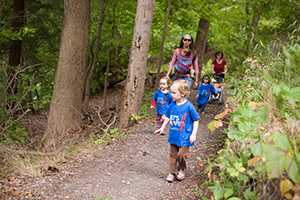
Plantations has committed to participating in First Lady, Michelle Obama’s Let’s Move! initiative for three years. In 2011, Plantations was the first organization in Ithaca, NY to offer a Let’s Move! program and plans to continue to offer additional programs that help to put children on the path to healthy futures.
*Miles calculated using stride of 2.5 on walk4life.com.
About Let’s Move!
Let’s Move! combines comprehensive strategies with common sense, and is about putting children on the path to a healthy future during their earliest months and years. Giving parents helpful information and fostering environments that support healthy choices and helping kids become more physically active are among a few of the goals of Let’s Move! For more information about Let’s Move! visit www.letsmove.gov.
Plantations Staff and Summer Interns Create Plans for New Gardens at the Harriet Tubman Home
A collaborative project involving Cornell Plantations and Cornell University landscape architecture students is focused on planting for the future while preserving the past. Plantations staff and summer interns from Cornell have been creating plans for new gardens at the historic Harriet Tubman Home in Auburn, NY.
Irene Lekstutis, landscape designer at Cornell Plantations and Landscape Architecture students from Cornell University who were interns at Plantations over the summer -- Daisy Chinburg ‘13, Robert Doerflinger ‘13, and Ethan Dropkin ‘13 –– met with Christine Carter of the Harriet Tubman Home several times this summer to discuss developing period appropriate planting plans, as well as creating a long-term master plan for future development of the property. It’s the desire of Ms. Carter and her colleagues to create gardens that Harriet Tubman would have grown during her life in Auburn, NY (1857 - 1913). 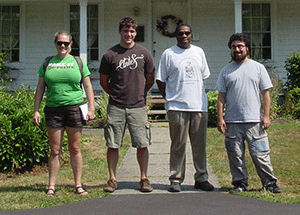
“Engaging our summer interns who are majoring in Landscape Architecture in a ‘real –world’ project like this has been very gratifying,” stated Lekstutis. “When Christine contacted Cornell Plantations about helping them improve the aesthetics of the Tubman Home landscape, we were thrilled. We all agreed it would be a great way to enhance the intern experience by providing these students with a project related to their particular field of study.”
It has been a long-time commitment of Cornell Plantations to collaborate with gardens, and historic sites across the country. This project, being so close to campus, makes it easy for these students and Plantations to continue with this collaboration. Plantations’ summer intern program plays an important role at the University, by giving students real world experience. For these students, they just didn’t gain experience from working with the professional staff at Plantations, but they were able to garner experience working with a client. They had to listen to the client’s needs, and had to deliver a plan that was relevant to the client’s budget and wish list.
While outside projects such as these are not typical of the internships at Plantations, Lekstutis saw the opportunity to further enhance the interns’ summer learning experience. Daisy Chinburg ’13 says, "We really lucked out this summer! It’s been great to have the opportunity to learn more about Harriet Tubman, while practicing landscape design skills. And working along side Plantations’ professional landscape designer was a bonus!”
During the course of the project, the interns spent time in Mann Library perusing old nursery catalogues and books on historic gardens to become familiar with herbaceous and woody plants commonly grown in gardens and landscapes of late 19th and early 20th centuries. By the end of summer the interns completed a planting plan for the brick residence on the Tubman site.
This fall Ms. Chinburg and Mr. Dropkin are continuing their involvement in the project through independent studies. Their goal is to develop a contemporary planting design, using period appropriate plants for the house that served as the Tubman Home for the Aged.
Chinburg will carry the project work further by developing a long-term master plan for the site. She says that, “working on this project over the summer helped me to discover my interest in cultural landscapes.” Now, in addition to working with the team on the master plan, she is developing a cultural landscape report under the guidance of associate professor Sherene Baugher, landscape archeologist and preservationist at Cornell University. This report will describe the research and methodology of their investigation into this historic landscape and will serve to inform the development of what will eventually be a long term master plan for bringing the history of the site ‘to life’ for the general public.
“I am so pleased to have been included in this mulch-faceted design project and to get a chance to work on such a talented team with Irene,” stated Eric Dropkin ‘13. “The project provides a variety of unusual learning opportunities as it includes not only a design element but also research of historical landscapes and planting palettes which we undertook on site as well as in the Bailey Hortorium at Mann Library. Both the Harriet Tubman Home and more so the Bailey Hortorium are relatively local resources that I doubt many Cornell students are aware of, however they are immense reservoirs of historical data.”
As part of Dropkin’s independent study this semester he is mainly focused on completing the garden designs. He’s using a period appropriate plant palette we're striving to create gardens which evoke the period and provide multi-season interest for visitors and staff alike.
About Harriet Tubman:
Harriet Tubman (1822-1913) was an African-American abolitionist, humanitarian, and Union spy during the American Civil War. After escaping from slavery she rescued more than 70 slaves using the Underground Railroad. After the Civil War, she retired to the family home in Auburn, where she cared for her aging parents. She became active in the women's suffrage movement in New York until complications from an illness made it impossible. Near the end of her life, she lived in a home for elderly African Americans that she had helped found years earlier. Today the Harriet Tubman Home stands as part of the indomitable legacy of Harriet Tubman. Ms. Tubman believed that no matter the odds you face, ‘keep going.’ She set goals and objectives that were always obtainable. Even if many around her thought the goals beyond reach, she always knew that they were indeed achievable.
About The Harriet Tubman Home:
The Harriet Tubman Home preserves the legacy of "The Moses of Her People" in the place where she lived and died in freedom. The site is located on 26 acres of land in Auburn, New York, and is owned and operated by the AME Zion Church. It includes four buildings, two of which were used by Harriet Tubman.
Fabric Banners by Alice Gant on Display at the Nevin Welcome Center
From now through October, you can visit the Nevin Welcome Center to view a collection of Alice Gant's vibrant quilted banners with detailed scenes of gardens and wildlife. Not only are these whimsical banners fun to look at, each one has a tidbit of wisdom to impart to its audience.
View the Nevin Welcome Center hours.
View more of Alice's artwork here.

New Acquisition Connects Two Plantations Natural Areas
Cornell Plantations is pleased to announce the successful protection of a seven-acre addition to the Caroline Pinnacles Natural Area in the Town of Caroline. The addition increases Plantations’ protected lands within the Bald Hill and Caroline Pinnacles Natural Areas to 265 acres, and of equal importance, provides a long sought connection between these two unique preserves.
“Our interest in protecting the Caroline Pinnacles originates from the educational value it possesses and the significance of its unique natural features,” stated Todd Bittner, director of the Cornell Plantations Natural Areas program. “For the past 150 years, naturalists, botanists and Cornell students have explored the steeply sloping hillsides to study the area’s unique environments.”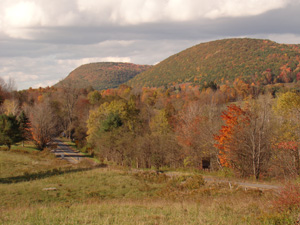 Caroline Pinnacles derives its name from one of the region’s most dramatic examples of a valley slope over-steepened by glaciers, which gouged at the valley-side as they moved back and forth through the White Church Valley over the millennia.
Caroline Pinnacles derives its name from one of the region’s most dramatic examples of a valley slope over-steepened by glaciers, which gouged at the valley-side as they moved back and forth through the White Church Valley over the millennia.
The west-southwest-facing aspect found there promotes harsh, dry growing conditions. Near the pinnacle’s top, rock outcrops are present, and the stature of the oak forests is dwarfed by exposure. The resulting open forests are dominated by chestnut oak (Quercus montana), red oak (Q. rubra), and black oak (Q. velutina).
Many rare or scarce species found here
Of particular significance is the presence of two plant species, hair grass (Deschampsia flexuosa) and lyrate rock-cress (Arabidopsis lyrata), which have their only known occurrence in the Cayuga Lake basin here. At least 18 locally rare or scarce species of vascular plants and vertebrates, including mountain laurel (Kalmia latifolia), pitch pine (Pinus rigida), and coal skink (Eumeces anthracinus), are also found in this unusual dry, warm, rocky habitat. 
Upcoming Lecture on Thomas Jefferson's Revolutionary Garden
Thomas Jefferson can be described as a man of many talents: inventor, philosopher, and musician, but Jefferson was also an accomplished horticulturist with a passion for the earth. Peter Hatch, author, garden historian and Monticello’s director of gardens and grounds emeritus, will be on hand to discuss the lasting legacy of Jefferson and his gardens at Monticello on Wednesday, September 26 at 7:30pm in Call Auditorium in Kennedy Hall on Cornell’s campus.
Peter Hatch will discuss Jefferson’s legacy in food, wine, and gardening and how it has affected the society that we live in today. Jefferson has provided us with a basis for vegetable cuisine, sustainable horticulture, and his gardens still serve to inspire the visitors to Monticello today.
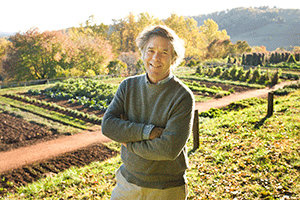
After a visit to Monticello in 2009, White House chef Sam Kass declared the gardens there, “…the most beautiful I had ever seen.” So inspired by them, Kass reserved a special section of the new White House Garden for Jefferson’s favorite vegetables. In the spring of 2010 Hatch was invited to the White House to help First Lady Michelle Obama, Kass, and school children to plant the redesigned White House kitchen garden.
Mr. Hatch told PBS in an interview, “…that Jefferson's interest in gardening really rose from this truly wide-eyed curiosity about the natural world. Even the site for Monticello was chosen not only for its obvious eminence and its glorious views of the central Virginia countryside, but also for its intimacy, for what Jefferson called, ‘the workhouse of nature’…I think that the landscape for Thomas Jefferson was very much a workhouse. And the gardens at Monticello became this laboratory. It was really through gardening that his experiments bore fruit, that his landscape assumed shape and form and color. And this whole drama of the natural world began to unfold under what was really his personal direction.”
Hatch’s lecture will examine a full sample of Jefferson’s favorite vegetables, from salsify to peas, by discussing both how they were grown and prepared at Monticello. He will also explore their history and place in the horticultural world of early nineteenth-century Virginia. Finally, Mr. Hatch will explore the precedent-setting vegetable garden restoration of the early 1980’s and the compelling Jefferson legacy in food and gardening today.
This third lecture in the Cornell Plantations 2012 Fall Lecture Series will take place on September 26 in Call Alumni Auditorium in Kennedy Hall at 7:30 PM.
Peter Hatch is the author of the new book, A Rich Spot of Earth: Thomas Jefferson’s Revolutionary Garden at Monticello. To learn more about Mr. Hatch please visit www.monticello.org.
Cornell Plantations Natural Area to be Added to the Old-growth Forest Network
Dr. Joan Maloof, ecologist, author, and founder of the Old-Growth Forest Network will be on hand to induct Plantations’ Fischer Old-Growth Forest into the “Network” on Thursday, September 13. The induction will take place after Dr. Maloof delivers the second lecture in Plantations’ 2012 Fall Lecture Series on Wednesday, September 12 entitled “Earth’s Beautiful Ancient Forests. Can There be a Happy Ending?"
Cornell Plantations’ Fischer Old-Growth Forest natural area is a majestic, magical, inspirational, preserve with trees over 150 feet tall. This site is a sanctuary in every sense of the word. The best of the few remaining examples of pre-settlement forest in the region, this old-growth forest is notable for the extreme size of many individual trees as well as the diversity of tree species. Almost 30 acres of the 42 acre preserve is old-growth forest.
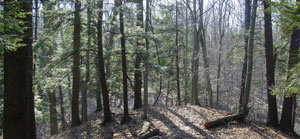 The inclusion of Fischer Old-Growth Forest into the network means that this preserve will be kept forever wild, and there will never be any logging. Dr. Joan Maloof’s website states, “When we look at a forest very little appears to change from year to year, but change is happening slowly. Forests, like humans, can be classified as young, mature or old. Because of past disturbances old forests are the rarest. Sometimes the disturbance has come in the form of a tornado, an insect, or an intense fire; but most often the disturbance has been from logging. As a result only a few percent of the western forests are old-growth, and only a few tenths of a percent of the eastern forests are old-growth. The amount of old-growth forest has declined every year since European settlement on this continent. As a result old-growth forests have important ecological and cultural attributes that are not being fulfilled as they should be. We need a clear vision and a strong resolve to reverse the decline. If we are able to accomplish this we will be the first generation to have done so.” Vegetation, specifically forests, helps sustain human life as we know it. The vital role forests play reflects the importance of preserving these natural areas in order to ensure their future.
The inclusion of Fischer Old-Growth Forest into the network means that this preserve will be kept forever wild, and there will never be any logging. Dr. Joan Maloof’s website states, “When we look at a forest very little appears to change from year to year, but change is happening slowly. Forests, like humans, can be classified as young, mature or old. Because of past disturbances old forests are the rarest. Sometimes the disturbance has come in the form of a tornado, an insect, or an intense fire; but most often the disturbance has been from logging. As a result only a few percent of the western forests are old-growth, and only a few tenths of a percent of the eastern forests are old-growth. The amount of old-growth forest has declined every year since European settlement on this continent. As a result old-growth forests have important ecological and cultural attributes that are not being fulfilled as they should be. We need a clear vision and a strong resolve to reverse the decline. If we are able to accomplish this we will be the first generation to have done so.” Vegetation, specifically forests, helps sustain human life as we know it. The vital role forests play reflects the importance of preserving these natural areas in order to ensure their future.
In the second installment of the 2012 Fall Lecture Series Dr. Maloof will speak about the condition of our forests today, and share her expertise on how we can help conserve them. Dr. Maloof’s lecture will take place on September 12th at the Statler Hall Auditorium at 7:30 PM.
To learn more about the Fischer Old-Growth Forest natural area, or to learn more about Cornell Plantations’ Natural Areas visit www.cornellplantations.org/our-gardens/natural-areas.
Let’s Move! With Cornell Plantations RESCHEDULED
Join us as we kick off Cornell Plantations’ Let’s Move! Family Hike on Saturday, September 15 (rescheduled from September 8 due to threat of severe weather) from the Nevin Welcome Center at 2 pm (hikers are welcome anytime between 2 and 5 pm). Let’s Move! is a comprehensive initiative, launched by First Lady, Michelle Obama, dedicated to raising a healthier generation of kids.
Visitors can stop in at the Brian C. Nevin Welcome Center, located at 124 Comstock Knoll Rd. in Ithaca, and take a hike through one of Plantations’ best-known natural areas – Beebe Lake. This one-mile loop is perfect for families, with a gentle path, beautiful flowers and trees and spectacular views of the surrounding Cornell campus. 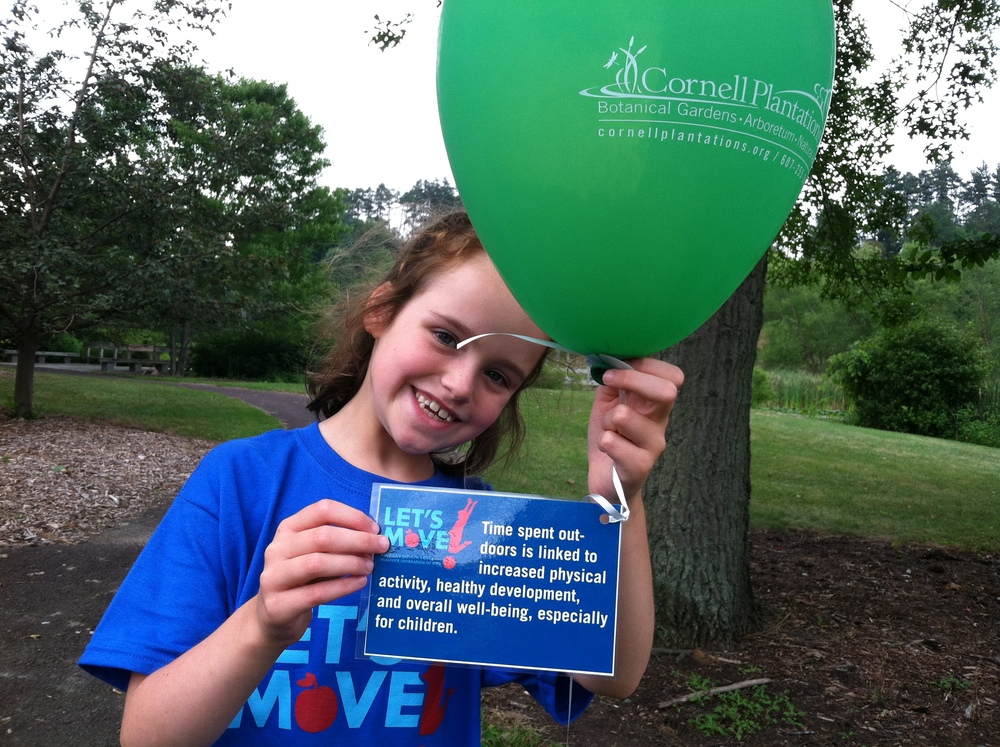
Along the way kids can have fun with a letter-boxing activity to search for hidden treasures and enjoy healthy snacks. The first 100 children to come on the hike will receive a free Let’s Move! t-shirt, along with a pedometer. All participating children will receive free gifts from YumEarth, and Yogurtland Ithaca.
“One of the many things that makes Cornell so special is its landscape. The gardens, trails, and natural areas cared for by Cornell Plantations are a rich resource for Cornell, our local communities and visitors worldwide. This Let's Move! family hike at Cornell Plantations aims to bring together the wonderful benefits of nature and physical activity, both of which are tremendously important in our own lives. We believe in Mrs. Obama's initiative to help families find ways to be happy and healthy together, and we think the Let’s Move! family hike at Cornell Plantations provides the perfect opportunity!"stated Dr. Robin Davisson.
In May of last year Mrs. Obama announced the Let’s Move! Museums and Gardens partnership with the American Museum Association and the American Public Garden Association (APGA). The partnership provides opportunities for millions of museum and garden visitors to learn about physical activity and healthy food choices through interactive programs and exhibits across the country, including here at Cornell Plantations, a member of the APGA.
“Plantations is thrilled to take part in the Let’s Move! initiative,” stated Sonja Skelly, director of education at Cornell Plantations. “Our arboretum, gardens, and natural areas are perfect places where families can come for a walk, a run, and some Vitamin N (for Nature) to increase overall wellness, physical activity – and most importantly to have fun!”
Let’s Move! combines comprehensive strategies with common sense, and is about putting children on the path to a healthy future during their earliest months and years. Giving parents helpful information and fostering environments that support healthy choices and helping kids become more physically active are among a few of the goals of Let’s Move! For more information about Let’s Move! visit www.letsmove.gov.
About Cornell Plantations:
Cornell Plantations is the botanical gardens, arboretum, and natural areas of Cornell University, and is a member of Ithaca’s Discovery Trail partnership. Plantations is open to the public year-round, free of charge, during daylight hours. The Brian C. Nevin Welcome Center is open daily (through September). For more information call 607-255-2400; visit cornellplantations.org; and find us on Facebook; follow us on Twitter and Pinterest @CUintheGarden.
Student Gorge Steward Program a Success this Summer
Since July, Cornell students patrolled Cascadilla and Fall Creek Gorges as one means to encourage visitors to use the gorges safely. They observed over 3,000 visitors and spoke with many of them.
Read more in the August 27th Cornell Daily Sun Article, "New Steward Program Acts as Cornell's 'Eyes, Ears and Mouth' in Gorges."



